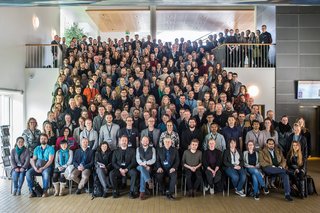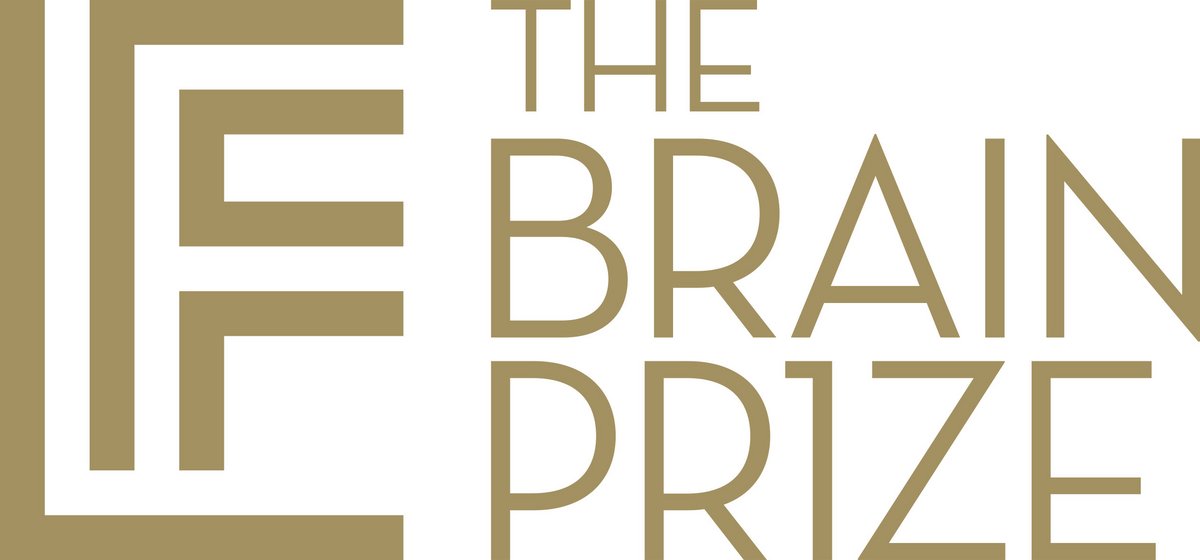Neuroscience Day 2018
Neuroscience Day 2018 - Rewarding Neuroscience
- Tuesday 1 May at the Lakeside Lecture Theatres, Aarhus University

On May 1, NeuroCampus Aarhus hosted ”Neuroscience Day 2018 - Rewarding Neuroscience”. The event was open to all students, researchers, clinicians, therapists, caregivers, foundations and organizations interested in neuroscience.
The central themes this year was "Reward and Punishment, Gambling and Addiction, Compulsion and Motivation, and Pleasure and Anhedonia”, i.e. the underlying molecular mechanisms in the healthy brain and what goes wrong in the diseased or affected brain.
Brain Prize Winner Prof Ray Dolan, Dr. Thomas Ramsøy from Neurons Inc. And Prof Morten Kringelbach from Hedonia and Center for Music in the Brain set the stage for many interesting talks and discussions on the topics.
Prof Morten Kringelbach was interviewed on P1 morgen regarding his keynote lecture on “Hedonia and eudaimonia: Towards whole-brain models in health and disease” at Neuroscience Day 2018. In the interview he explains how psychedelic drugs, such as LSD, under controlled circumstances can help terminal cancer patients who suffers from anxiety and depression. Listen to the full interview here.
We are truly grateful for the great support from Aarhus University and The Brain Prize, as well as from Janvier Labs (lunch sponsor and exhibitor), Zeiss (poster prize sponsor and exhibitor), AgnTho’s, BioNordika, Nordic Biosite, and Olympus (all exhibitors).
The Book of Abstracts was printed as an issue of Acta Neuropsychiatrica - an International Journal of Translational Neuropsychiatry. An online version is available here.
Program
Link to sponsors and exhibitions
_____________________________
Winner of Zeiss poster prize
Translation regulation in neurodegenerative diseases: what we know about the eukaryotic elongation factor-2 (eEF2K) kinase in Alzheimer and Parkinson’s disease
Asad Jan1, Brandon Jansonius3, Alberto Delaidelli2, Forum Bhanshali4, Nelson Ferreira5, Gian Luca Negri2, Poul H. Jensen5, Ian MacKenzie2, Stefan Taubert4, Poul H. Sorensen2,3.
1Aarhus Institute of Advanced Studies, Aarhus University, Department of Biomedicine, Høegh-Guldbergs Gade 6B, DK-8000 Aarhus C, Denmark
2Department of Pathology and Laboratory Medicine, University of British Columbia, Vancouver, Canada 3British Columbia Cancer Research Centre, Vancouver, BC V5Z 1L3 Canada
4Centre for Molecular Medicine and Therapeutics, Child and Family Research Institute, Department of Medical Genetics, University of British Columbia, Vancouver, BC V5Z 4H4, Canada
5Danish Research Institute of Translational Neuroscience, Department of Biomedicine, Aarhus University, Ole Worms Allé 3, DK-8000 Aarhus C, Denmark.
Winners of NeuroCampus poster prizes
Development of a novel in vitro model of Parkinson’s disease to study prion-like spreading of a-synuclein aggregate pathology in mouse brain tissue
Sara Elfarrash1,2, 4, Emil Gregersen1, 2, Nanna Møller Jensen1, 2, Nelson Ferreira1, 2, Cristine Betzer1, 2, Sadegh Nabavi 1, 3, Poul Henning Jensen1, 2.
1Neurodegenerative disease laboratory and Nabavi group, Danish Research Institute of Translational Neuroscience – DANDRITE, Aarhus University, Aarhus, Denmark
2Department of Biomedicine, Aarhus University, Aarhus, Denmark 3Department of Molecular Biology and Genetics
4Mansoura University, Egypt
Effect of Maternal Exercise on Developmental Programming of Hippocampal Neuroglial Plasticity and associated Behavioural Deficits Induced by High-Fat Diet
Gudrun Winther1, Maryam Ardalan1,2,3, Jibrin Danladi1, Bardia Varasteh1, Fenghua Chen1, Ali H. Rafati1,2, Brian Hansen3, Amanda Eskelund1, Heidi Kaastrup Müller1, Betina Elfving1, Sten Lund4, Anders Lade Nielsen5, Gregers Wegener1.
1Department of Clinical Medicine, Translational Neuropsychiatry Unit, Aarhus University, Risskov, Denmark 2Department of Physiology, Institute of Neuroscience and Physiology, Sahlgrenska Academy, University of Gothenburg, Gothenburg, Sweden
3Center of Functionally Integrative Neuroscience, Institute of Clinical Medicine, Aarhus University, Aarhus, Denmark
4Department of Endocrinology and Internal Medicine Medical Research Laboratory, Aarhus University Hospital, Aarhus, Denmark
5Department of Biomedicine, Aarhus University, Aarhus, Denmark
Response inhibition after deep brain stimulation in Parkinson’s disease patients
Andreas Højlund1, Mikkel V. Petersen1, Kousik Sarathy Sridharan1,3, Marie Louise Holm Møller2, Amalie Staggemeier2, Sabine Grene Thomsen2, Mette Møller3, Erik Lisbjerg Johnsen3, Yury Shtyrov1, Karen Østergaard1,3.
1Center of Functionally Integrative Neuroscience (CFIN), Aarhus University.
2Department of Linguistics, Cognitive Science and Semiotics, Aarhus University
3Department of Neurology, Aarhus University Hospital
MVPA analysis of ITPC data as a tool to classify automatic neurolinguistic processes in the brain
Mads Jensen1,2, Rasha Hyder1,2, Yury Shtyrov1,2.
1NeDComm - NeuroDynamics of Human Communication Lab
2Center of Functionally Integrative Neuroscience (CFIN) Aarhus University, Denmark
Involvement of the CD163 receptor in the alphasynuclein induced neurodegeneration in Parkinson’s disease
Sara R.A. Ferreira1, Ida Klæstrup1, Pia Svedsen1,2, Søren K. Moestrup1,2, Marina Romero-Ramos1.
1Department of Biomedicine, Aarhus University, Denmark
2Department of Cancer and Inflammation Research, Syddansk University, Odense, Denmark
Alpha-synuclein aggregates activate calcium pump SERCA leading to calcium dysregulation – a new mechanism with therapeutical potential
Betzer C1,2, Lassen LB1,2, Olsen A3, Kofoed RH1,2, Reimer L1,2, Gregersen E1,2, Zheng J1,2, Calì T4, Gai WP5, Chen T6, Moeller A1,7, Brini M8, Fu Y9, Halliday G9, Brudek T10, Aznar S10, Pakkenberg B10, Andersen JP2, Jensen PH1,2.
1Neurodegenerative disease laboratory, Danish Research Institute of Translational Neuroscience - DANDRITE, Aarhus University, Aarhus, Denmark.
2Department of Biomedicine, Aarhus University, Aarhus, Denmark.
3Department of Molecular Biology and Genetics, Aarhus University, Aarhus, Denmark.
4Department of Biomedical Sciences, University of Padova, Padova, Italy.
5Neuropathological Laboratory, Department of Medicine, Center for Neurological Diseases, University of Adelaide, Adelaide, SA, Australia.
6Department of Medical Biochemistry, School of Medicine, Flinders University, Bedford Park, SA, Australia. 7Department of Structural Biology, Max Planck Institute of Biophysics, Frankfurt, Germany.
8Department of Biology, University of Padova, Padova, Italy.
9Brain & Mind Centre, Sydney Medical School, The University of Sydney, Sydney, NSW, Australia. 10Research Laboratory for Stereology and Neuroscience, Bispebjerg- Frederiksberg Hospital, Copenhagen, Denmark.
_____________________________
Invited keynote speakers:
- 2017 Brain Prize Winner Prof. Ray Dolan, University College London. More information here
- Prof. Morten Kringelbach, Aarhus University and University of Oxford. More information here
- Dr. Thomas Ramsøy, Neurons Inc. More information here
Invited speakers:
- Prof. Kristine Rømer Thomsen, Centre for Alcohol and Drug Research, Aarhus University
- Prof. Rikke Schubart, Dept. for the Study of Culture, University of Southern Denmark
- Prof. Duda Kvitsiani, DANDRITE, Aarhus University
- Prof. Simon Glerup, Dept. of Biomedicine, Aarhus University
- Tadeusz Hawrot, Senior Policy Officer, European Brain Council
Foundations, associations, and organizations in attendance:
- The Brain Prize, Lundbeckfonden
- Novo Nordisk Foundation
- Dansk Selskab for Neurorehabilitering
- SIND – Landsforeningen for psykisk sundhed
Venue
Aarhus University
Lakeside Lecture Theatres (Søauditorierne)
Bartholins Allé 3, bldg. 1250
DK-8000 Aarhus C
See location on a map HERE
Contact
For questions regarding registration, program, presentations, exhibitions, etc. please contact:
Susanne Schousboe Sjøgaard
Department of Biomedicine
Aarhus University
Ole Worms Allé 3, building 1171
8000 Aarhus C
Denmark
Email: susanne@dandrite.au.dk

NCA Neuroscience Day 2018 with more than 350 participants.
